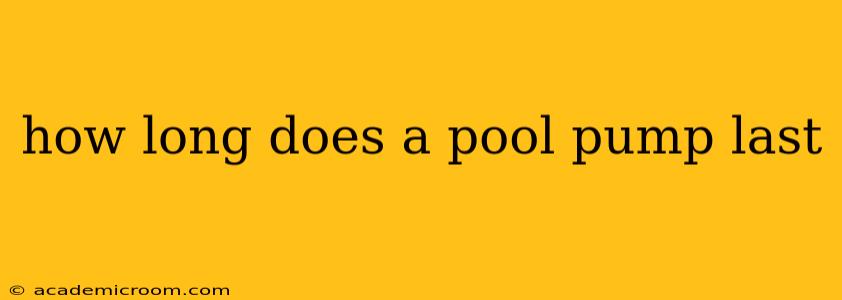How Long Does a Pool Pump Last? A Deep Dive into Pool Pump Lifespans
Owning a swimming pool is a joy, but maintaining it requires dedication and understanding of its various components. One of the most crucial parts of your pool system is the pump, responsible for circulating water, filtering debris, and keeping your pool clean and healthy. But how long can you expect your pool pump to keep chugging along? The simple answer is: it depends. Several factors influence a pool pump's lifespan, making a precise answer elusive. However, let's delve into the specifics to help you understand what you can expect.
What is the average lifespan of a pool pump?
On average, a well-maintained pool pump can last anywhere from 7 to 15 years. However, this is a broad range, and the actual lifespan can vary significantly based on several key factors. Some pumps may fail prematurely due to unforeseen circumstances, while others, with proper care, may exceed the upper end of this range.
What factors affect the lifespan of a pool pump?
Several factors contribute to the longevity of your pool pump. Understanding these factors can help you proactively extend its lifespan.
-
Pump Type: Different types of pool pumps have varying lifespans. Older single-speed pumps often have shorter lifespans than more energy-efficient variable-speed pumps. Variable-speed pumps, while more expensive upfront, can often last longer due to reduced wear and tear from less strenuous operation.
-
Usage Frequency: The more frequently you run your pool pump, the faster it will wear down. Continuous, heavy-duty use accelerates wear on components. Conversely, infrequent use might lead to issues with seals and bearings due to lack of lubrication.
-
Water Quality: Poor water quality can lead to increased wear and tear on the pump. High levels of debris, minerals, or chemicals can cause clogging, corrosion, and damage to internal components. Regular cleaning and water maintenance are crucial.
-
Maintenance Schedule: Regular maintenance is the single most significant factor influencing pump longevity. This includes regular inspections, cleaning of the pump basket and impeller, lubrication of bearings (where applicable), and prompt attention to any unusual noises or vibrations. Ignoring maintenance inevitably leads to premature failure.
-
Environmental Conditions: Exposure to harsh weather conditions, such as extreme heat or freezing temperatures, can stress the pump and its components, potentially shortening its lifespan. Proper protection during inclement weather is essential.
How can I extend the life of my pool pump?
Taking proactive steps to maintain your pool pump can significantly extend its lifespan. Here are some key practices:
-
Regular Cleaning: Clean the pump basket regularly to prevent clogging and ensure efficient operation. Inspect the impeller for damage or debris buildup.
-
Proper Lubrication: Lubricate bearings as needed according to the manufacturer's instructions.
-
Check for Leaks: Regularly check for any leaks around the pump housing or seals. Address any leaks promptly to prevent further damage.
-
Avoid Running Dry: Never run the pump dry. This can cause severe damage to the impeller and motor.
-
Choose the Right Size Pump: Ensure the pump is appropriately sized for your pool's volume. An undersized pump will work harder and wear out faster, while an oversized pump might be unnecessarily taxing.
What are the signs that my pool pump needs to be replaced?
Several signs indicate that your pool pump may be nearing the end of its life:
-
Unusual Noises: Loud humming, grinding, or rattling sounds suggest internal damage.
-
Reduced Water Flow: A noticeable decrease in water flow indicates a potential problem with the impeller or pump motor.
-
Frequent Overheating: The pump casing becomes excessively hot to the touch.
-
Leaks: Obvious leaks from seals or the pump housing.
-
High Energy Bills: An older, inefficient pump can significantly increase your energy consumption.
By understanding the factors affecting pool pump lifespan and adopting a proactive maintenance approach, you can significantly increase the longevity of your pool pump, saving you money and ensuring your pool stays sparkling clean for years to come. Remember, regular inspections and prompt attention to any issues are key to maximizing your pump's lifespan.
